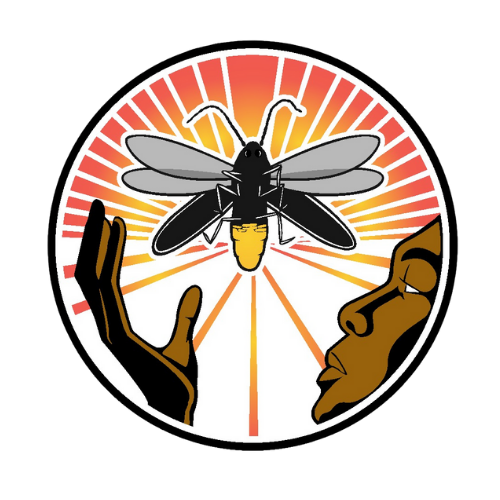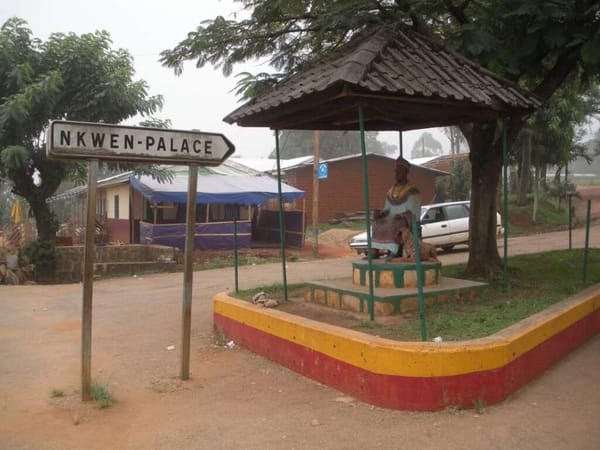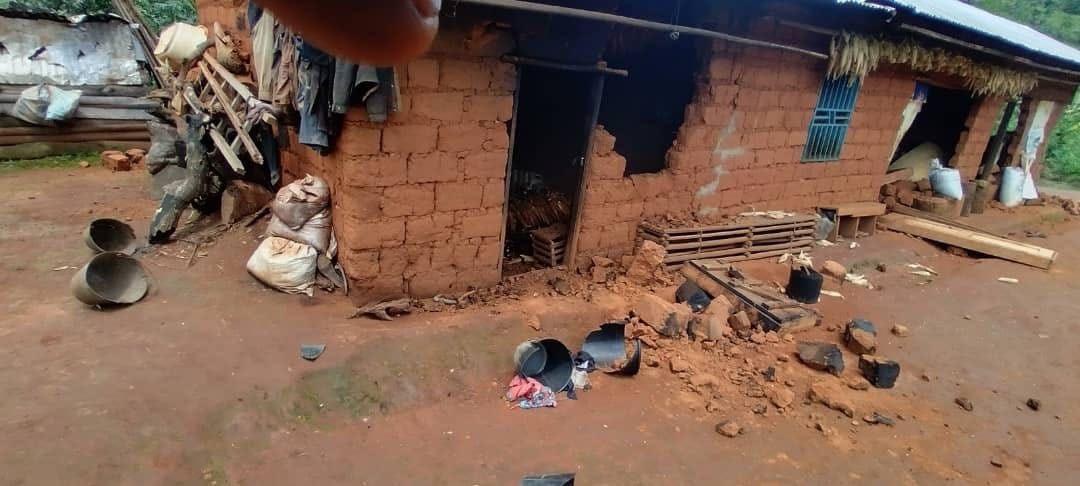“Developing” Our Ancestral Villages: The Case of Nkewn Village




By: Tamasang Asongwe
Each time my grandma asked me to go harvest a few withering plantain leaves in our garden, I knew she was about to prepare either fufu corn or the more popular achu, made from mashed cocoyams and eaten with an alkaline fiery palm-oil-based sauce known for its healing properties. I could tell days before that she would be cooking achu by observing the type of fallen tree branches we picked from the nearby forest to use as firewood for our three-stone stove.

She used the ashes a day before to distill the most alkaline edible solution I know to date. I was not old enough to start primary school, but I knew how to harvest the lower hanging withering leaves that were about to fall off from any plantain tree in our garden with a homemade pole pruner. We were careful not to touch the vibrant leaves. Some of them grew more than 4 meters long. Great grandma taught me how to make the leaves more resistant to tears by rapidly sliding each one over an open air fire, barely allowing the flames to touch it. When we package our fufu or achu with plantain leaves, we do not have to worry about bad chemicals leaching into the food. And when we are done eating, we throw the used leaves back into the garden. They decompose and serve as compost.
All activities in my village must align with Nature. It is not something you are taught. You grow in it and just do it because you know it makes life easier in every aspect. Nobody had to teach school children in my village that they should not throw plastic papers and containers of goods (brought into the village from the nearby town) into gardens. We observed that those were bad products because they did not fit into the natural cycle of construction and destruction.
When I proudly informed my peers in primary school in the nearby town that we do not wash plates in my village, they laughed at the idea. I pressed on, explaining how we made our plates and reaped, but more laughter; a "primitive" village boy had nothing to tell town dwellers.
After washing your hands, you carefully unwrap a portion of achu (or fufu) that is packaged in a plantain leaf and place it at the center of its leaf on your dining table. Despite the aforementioned process of strengthening each plantain leaf with fire, a leaf can still tear along one of its natural lines if the unwrapping is not done with care. If a spare is unavailable, then a torn leaf will ruin the entire effort to harmonize with Nature.
Using only the index and middle fingers of your right hand, you proceed and reshape the achu or fufu such that the entire content forms the walls of a cylinder - a soup bowl. You strive to keep the inner diameter of the food cylinder as large as the leaf allows, just so it can hold enough sauce. Eating is done only with the index and middle fingers of the right hand and such that the cylindrical form is maintained as the food progressively thins out. The sauce must always stay inside the makeshift bowl down to the last lick. When you are done eating, you throw the leaf back into the garden and leave it there to decompose. If there was some leftover, you would carefully place it inside the garden; a dog will for sure be following you to take care of it.
Since then, more and more waste has kept coming in from the nearby town. Some of the market square palm wine parlours swapped the large calabashes they used for retailing with bottles that town dwellers threw away after drinking their imported red wine. Rolled dried plantain leaves replaced the missing wooden corks; they copied the corking technique used by our palm wine tappers.
As time progressed, the calabashes started disappearing. The younger ones of my village who were indoctrinated by the predominantly catholic schools started abandoning the time-tested tradition of mixed cropping. Fewer and fewer farmers bothered to grow calabash fruits, which were often harvested and allowed to dry so they could be used as utensils. The demand for calabash utensils and locally made ceramic ones slowed down as more families started swapping those with imported iron pots, plates and bowls that they had to clean with imported detergents that aren't biodegradable.
We did not drink coffee and yet some farmers in my village started planting coffee trees. Snake oil salesmen working for the colonial government came promising huge profits from coffee beans. The nearby forest from which we harvested withering bamboo to build our homes had to make space for coffee trees. In the forest, we harvested strictly tree branches and bamboo that were drying up because we understood that's how we benefit from the forest without destroying it.
The reed we used for thatching our roofs was replaced with imported rust-prone iron sheets. The finest craftsman I witnessed renovating the thatched roof of my great grandma (Pa More) transitioned with his talent. Youths were no longer interested in learning from him because more and more families were replacing their thatched roofs with iron sheets.
I still remember the first time I spent a few minutes in the home of a neighbour who was considered more advanced because it was roofed with iron sheets. It was raining, and it was extremely loud inside. After that, I was anxious to inform my parents that we should never replace our thatched roof with iron sheets. My dad smiled and added I should know it is also very hot inside those types of homes on a sunny day.
In the twinkling of an eye, the neighbourhood I grew up in, which was part of my village, is no more. Nothing, absolutely nothing, is left. Even the pristine stream further downhill, where we fetched drinking water long since dried up. If I could rewind the clock, I would travel around my village, reminding my people, especially the younger generations, to always maintain the way of life our ancestors left behind. They taught us how to live in harmony with Nature. My village will still be intact and thriving if our daily activities had remained aligned with Nature.
We should never have allowed the construction of all those catholic churches and schools. Those and other colonial institutions introduced the system that started and accelerated the destruction of my village. We were told we were underdeveloped and needed development assistance. We should have started fighting back the moment we realized development meant going to war with Nature. The little farmland we have left is littered with imported plastic bags, broken glass bottles, cans and rusting utensils. It is awash with toxic chemicals.
I shudder at the thought of having to explain what happened within such a short period to my great-grandma. She will ask to know why we deviated from the way of life her generation painstakingly preserved and passed on.